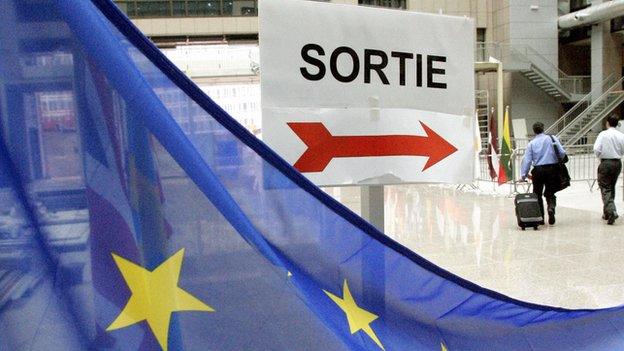Labour to back EU referendum bill, says Harman
- Published
Harriet Harman: "The benefits of Europe are not equally shared and they need to be"
Acting leader Harriet Harman has said Labour will now support plans for an EU referendum by the end of 2017.
Ms Harman told the Sunday Times the change in position came after they "reflected on the conversations we had on doorsteps" during the election.
The PM has pledged to renegotiate a "better deal" for the UK and hold an "in/out" referendum by the end of 2017.
Ms Harman told the BBC's Andrew Marr Show the party would still campaign for the UK to stay in the EU.
She said: "Whether we are in the European Union or not is a huge, important, constitutional, political, economic decision."
The Conservatives were bringing forward a bill to allow the referendum to happen, said Ms Harman, and Labour "wouldn't succeed" in stopping it.
'Big questions'
She added: "There just does not seem to be the public appetite for us to man the barricades against a referendum that appears inevitably going to happen. We will vote for the bill and then get into the big questions for and against Europe."
Labour's decision to support the referendum bill, which is expected to be in Wednesday's Queen's Speech, means it should be able to speed through Parliament without serious delays.

Analysis, by BBC political correspondent Carole Walker
Labour's change of heart on Europe brings the party's overall position into line with that already taken by several of the candidates hoping to be its new leader. What'll be interesting to see is whether Labour will actually whip all of its MPs to support continuing EU membership when it actually comes to the crunch. We don't often hear about it, but there is a significant minority in the party that is Eurosceptic
For now, though, I think this is Labour facing up to reality - for them to be saying, 'No, no, we don't want people to have a say in this' just wouldn't be the best direction to pursue.

Business Secretary Sajid Javid told the Andrew Marr Show that the government was "not pretending it was going to be easy" to get the changes required.
But minds would be concentrated elsewhere in the EU now that the referendum was going to happen, he said.
"We are going to need some patience but we will get there," Mr Javid said, especially on getting changes to things like the welfare payments available to new arrivals from elsewhere in Europe.
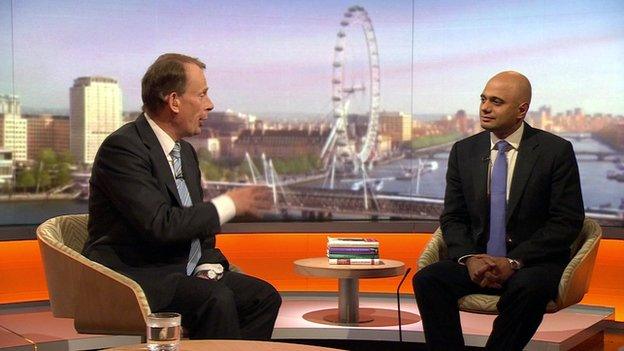
Sajid Javid, right, on the Andrew Marr Show
He added that limiting the rights of EU migrants to claim tax credits was a key part of the renegotiation of Britain's relationship with the EU.
Mr Javid said EU migrants could currently receive £700 per month in tax credits, twice what they would receive in Germany. He said "that's the kind of thing we need to change. It's a very key part of our negotiation."

EU referendum in focus
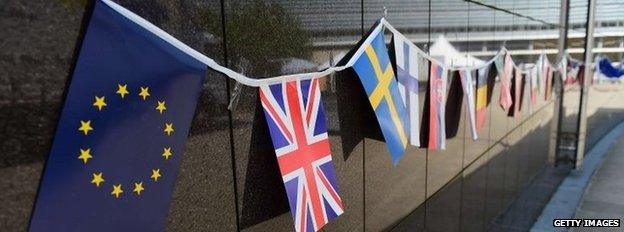
David Cameron is ready to start renegotiating the terms of Britain's EU membership ahead of a referendum. Here is some further reading on what it all means:
The UK and the EU: Better off in or out?
What Britain wants from Europe
Q&A: The UK's planned EU referendum

Ms Harman said Labour agreed with the principle that people should have had to pay in before getting welfare payments, and said Labour also wanted to see change on the tax credit rules - although stressing this could be achieved by increasing the minimum wage.
She said that while Labour would now support the bill, she did not want to see the referendum held on the same day as other elections as it was "a big constitutional question which needs separate consideration".
The settled view in Labour was that the UK's future lay in being a member of the EU, Ms Harman added.
PM's election 'credit'
UKIP leader Nigel Farage said Labour had been "dragged unwillingly to accept the inevitable" that there would be a referendum, but said they appeared to have learned little from their election defeat.
"They grudgingly accept that it is the will of the British people to have a say on their future, but they make it clear that they will campaign for an in, whatever the result of Mr Cameron's negotiations. So in reality this isn't a conversion to democracy and the facts of the European argument, merely an acceptance of the inevitable," he said.
The Labour U-turn came on the same day that Pascal Lamy, who was director general of the World Trade Organization for 13 years, urged David Cameron to make the positive case for Europe if he wants to successfully renegotiate the UK's terms of membership with fellow EU leaders.
In an interview to be broadcast later on BBC Radio 4's The World This Weekend, Mr Lamy - who now heads up the think tank Notre Europe - said he did not agree with the view "that the Brits have always been a pain in the ass so they can leave and it would be fine".
He said the prime minister started with some credit because of his election victory.
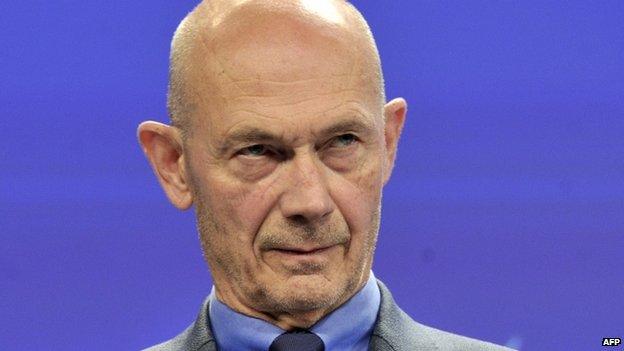
Pascal Lamy
"[David Cameron] won an election in a reasonably brilliant way as a politician, as a professional of politics he did a good job and these guys are in the same job and they recognise that", he said.
"There are issues of substance, but the psychology of that matters very much."
He warned there would be some red lines, such as free movement of people but there was a "margin of manoeuvre" over this and exempting the UK from "ever closer union".
He suggested Mr Cameron's tone would be important.
"Most European leaders, including myself, feel David Cameron needs to be able to make a good case for Europe in the referendum."
'Two miracles'
Mr Lamy said if Britain left, it would be bad news for the EU.
He said in his previous jobs, he found world leaders, like the presidents of China and Brazil, felt the EU was founded on two miracles - peace between France and Germany, and British membership.
The BBC's Mark Mardell, presenter of the World This Weekend said: "As a high profile, fervent believer in European integration Mr Pascal's words are important - and suggest the European establishment want to give Mr Cameron a deal that will help him win a referendum".
Listen to the The World This Weekend on BBC Radio Four on Sunday at 13:00 BST, and after that on BBC iPlayer.
- Published24 May 2015
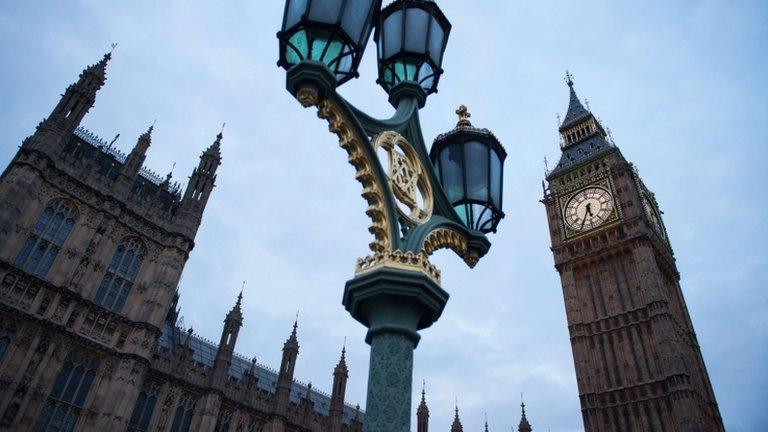
- Published30 December 2020

- Published24 May 2015
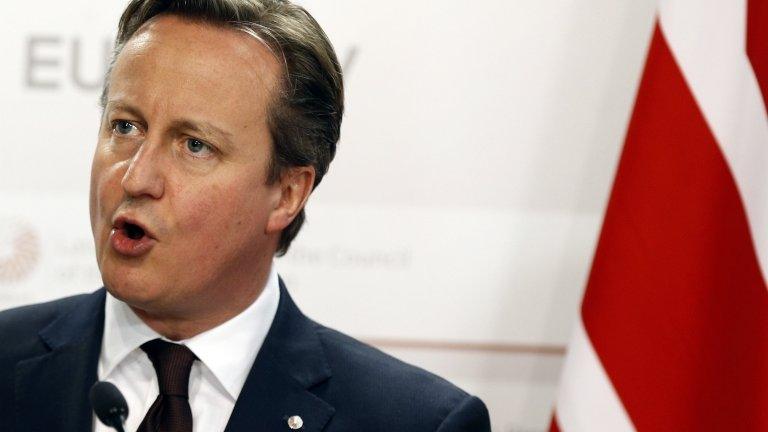
- Published17 February 2016
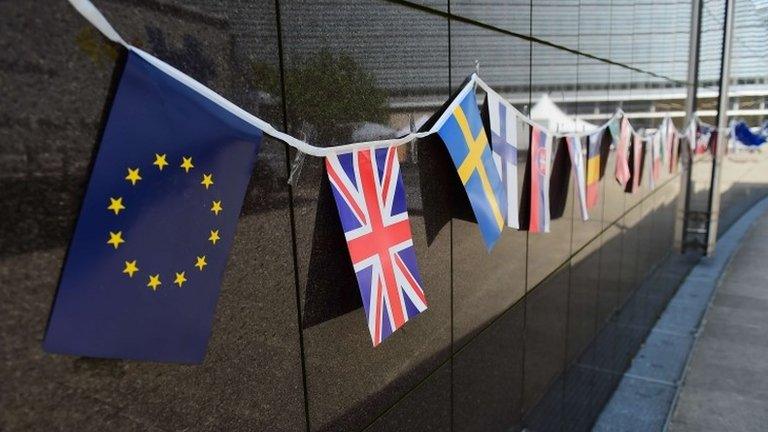
- Published26 May 2016
